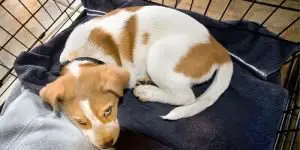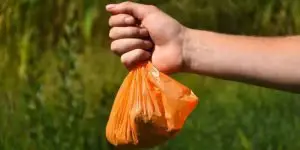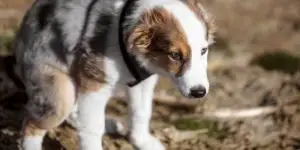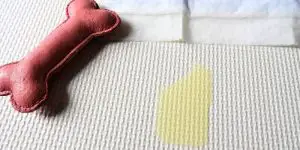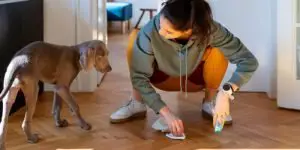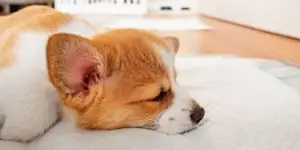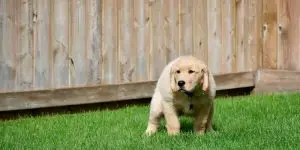
Why Does My Puppy Pee Inside After Being Outside?
- Written by Dr. Cristina Vulpe
- Last updated
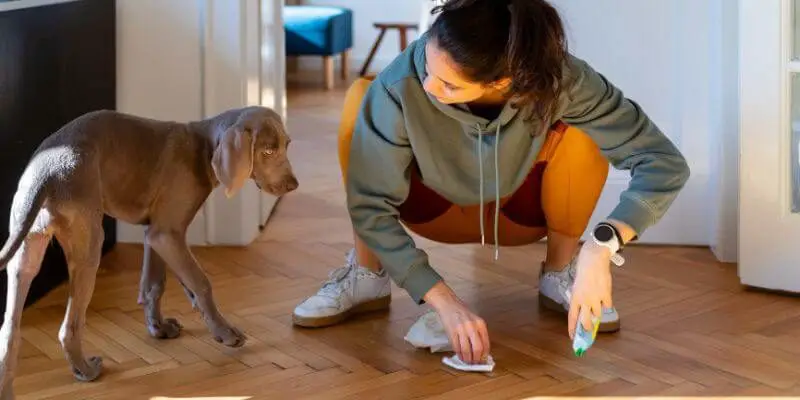
Why does your puppy pee inside after being outside? Key takeaways
- Housetraining your puppy takes time and commitment. It’s not uncommon for puppies to have accidents even after they’ve had training. Some puppies can take up to 6-months to become fully potty-trained so stay patient.
- Seek your Vet’s advice if this issue continues longer than a month after you feel they have been trained. It’s always better to get advice from your Vet to rule out any medical conditions.
- Attention-seeking behavior. Dogs crave the attention of their owners, even if it’s not in a positive manner so make sure you spend enough time with your pup throughout the day to avoid this.
- Your puppy may be nervous or distracted. It’s not uncommon for your puppy to go into sensory overload when they’re outside. Make sure you give them positive reinforcement whilst not making it a game/play time if they’re outside specifically for a potty break.
- Maintain a potty schedule. Dogs thrive off routine so make sure potty breaks are an integral part of your daily schedule.
- Designate a specific outdoor bathroom area. This will bring familiarity and routine to your puppy.
- Give your puppy at least 10-15 minutes to finish urinating. Owners can make the mistake of seeing their dog pee once and thinking that’s enough. Allow for multiple chances to pee over a 10+ min period.
In this article
Why Does My Puppy Pee Inside After Being Outside?
Housetraining a puppy takes time and quite a bit of commitment.
It’s not really uncommon for puppies to have accidents now and then, but if they always seem to happen right after you take your pet out for potty breaks, it can mean something different.
Read on to find out whether you should be worried about your puppy peeing indoors after they’ve just been taken outside for a walk.
Reasons Puppies Pee Inside Instead of Outside
They aren’t completely potty-trained yet
Some dogs can take longer to become potty-trained, especially if you haven’t adopted them really young. The same goes for situations where they were exclusively kept indoors by their previous owners.
And while keeping pups inside the house for the first six to nine weeks of their lives is definitely recommended as it prevents them from contracting potentially lethal infectious diseases, it can also delay the potty training process.
Most dogs don’t become fully potty trained until they reach the age of six months, and even then they may have occasional accidents if they get nervous or fearful.
Taking your dog out to the garden or for very frequent walks can solve some of the issue and get them used to the idea that they should ‘go to the bathroom’ outside instead of indoors
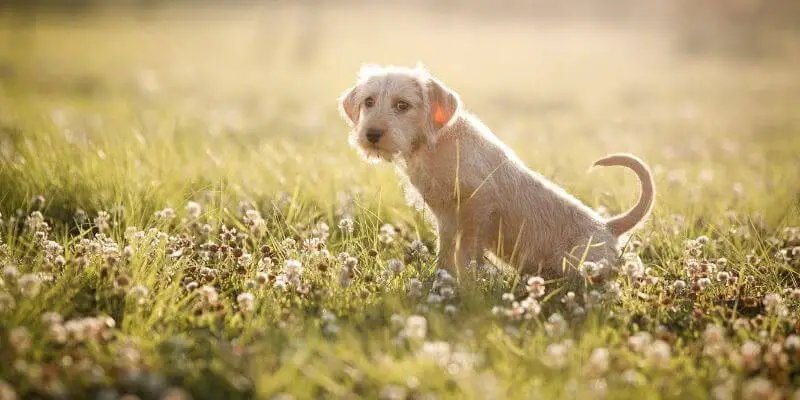
They could have a medical condition
If you know for a fact that your puppy is house-trained and they haven’t had such accidents in a while now (at least two to three months), it’s probably time to see the vet.
There are several different health issues that can cause inappropriate elimination, and the fact that it occurs right after you get them back indoors might be a mere coincidence.
Some examples of medical conditions that can lead to this are listed below:
- Cushing’s disease
- Addison’s disease
- Urinary tract infections
- Renal health issues
- Gastroenteritis
- Diabetes
Virtually any health problem that makes your dog be in pain or in some sort of discomfort while walking or engaging in exercise can make them experience inappropriate elimination.
If they have diabetes, for example, your puppy may drink a lot of water and also pee a lot.
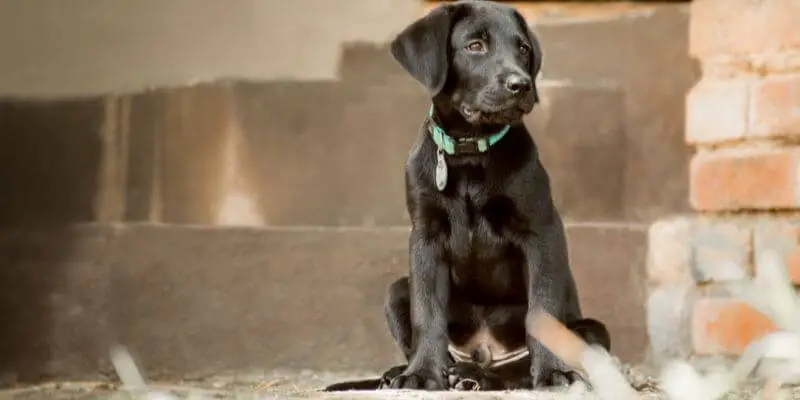
They may be nervous or distracted
Puppies can be compared to young children in some ways. Although they are animals, they use their senses to gauge the world around them.
Therefore, it wouldn’t be uncommon for them to go into sensory overload whenever they go outside for the first few times.
If they are not distracted, they may be fearful of other animals or even scents that they have picked up from the grass or ground. Perhaps other dominant males have gone through the area and marked it as their territory.
Puppies need encouragement and positive reinforcement from you so that they know it’s safe for them to go potty outdoors.
Lingering odors
Your puppy could be peeing inside after a walk because they may have marked some spots throughout your home and you haven’t gotten rid of the smells.
Enzymatic cleaners can do a good job in this sense.
Even so, you should know that it can take a significant amount of time for you to get rid of the pheromones and other natural substances that your dog might have left on your floors while you were using pee pads.
Weather can be a factor
It may sound strange, but some dogs absolutely loathe getting dirty. As such, they might not feel comfortable letting go and pee or poop in an area that was soaked by rain or is covered in mud.
This can happen to the point that they will hold it on purpose until they get back home and know they can ‘tend to their business’ in the same place they’ve been using for the past days or weeks.
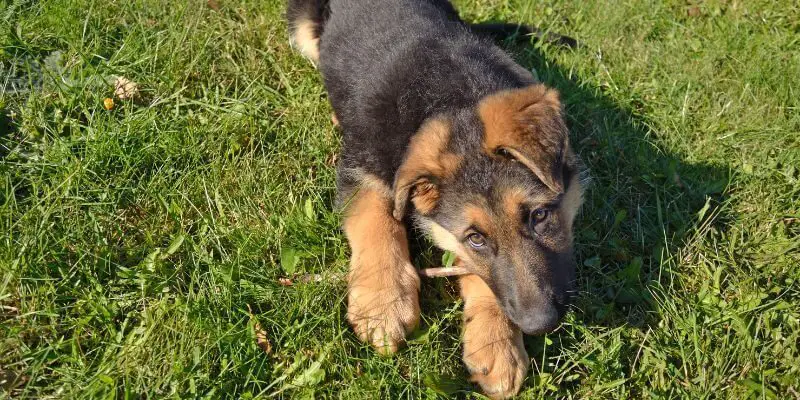
Premature praise
Even if your puppy’s bladder is full and they can’t wait to pee outside, if you start cheering them on and rewarding them when they haven’t fully emptied their bladder, they might urinate in the house afterward, too.
Do not interrupt your dog as they are going potty. Only after you know for sure that they’ve finished are you allowed to tell them they’re a ‘good boy’ or a ‘good girl’ and give them a snack, if you feel the need to.
Attention-seeking behavior
Dogs have been in tune with people for thousands of years, ever since they became our closest friends.
And by now, they know for a fact that there isn’t something quite as attention-grabbing as them behaving strangely.
Even if they know that the attention they are getting isn’t necessarily positive when they pee in inappropriate places, it’s still a form of attention.
Make sure you are spending more than enough time with your pet every day and taking them out for long walks, especially when they are young.
Solutions to overcome puppy potty training issues
Maintain a consistent potty schedule
Dog owners know that they have to take their pets out for walks every morning and every evening.
But try to make the difference between these longer walks and the shorter ones you’re organizing because you do not want your canine friend to pee indoors.
You can also feed your dog at specific times throughout the day so that you have an estimate of when they’re likely to want to ‘go to the bathroom’.
Designate a specific outdoor bathroom area
If your puppy marks a specific area outdoors for their potty breaks and you take them to a completely different part of your neighborhood the next time around, they’re not going to feel as comfortable.
When they know that they’ve gone potty in a spot before, they know it’s safe – even if other dogs have been around, too.
Give your dog 10-15 minutes to finish urinating
It may be challenging for you and your family to have that much patience, but when you take your puppy out for a potty break, you shouldn’t grab the leash and stroll down the street at a blazing speed.
That is not going to give your dog the opportunity to find a good place for a potty.
Leave your dog to finish urinating and pooping whenever you see them wanting to do so. Do not talk to them – let them focus so that they empty their bladder completely.
Reward your dog after they finish urinating
Praise and treat your pup once they’ve peed and pooped is always a good addition to your routine. Dogs can easily associate the praise and the reward with whatever happens after they go potty, particularly if you do it time and again.
If you are not sure whether or not your pup is finished and you think they will want to pee again in a different spot, delay the reward until you are convinced.
Do not play with your dog
As entertaining as playtime can be for both yourself and your pet, it’s not going to do a lot in the way of teaching them a specific routine.
Make sure that you set healthy boundaries where your dog first pees and poops and once all that is done, you can finally have fun together. Play is a form of reward, by the way, so let your dog tend to their needs calmly and quietly.
Increase your puppies’ walk/garden time
Outdoor potty training takes a long time and calls for consistent effort and commitment on your end.
But if your dog is not exposed to the outdoors as often as they may need to in order for them to go potty outside, you can’t really blame your pet.
When they’re still young but potty training has not resumed, take them out at least once every hour. That way, they also have no chance of going into sensory overload when you take them out for a longer potty break.
What do you do when you catch your puppy peeing indoors?
Telling your puppy off can cause pee anxiety
Dogs can get stressed for a wide range of reasons, and if they’re more likely to get scared ever since they’re young, they may develop all sorts of behavioral complications.
If you want your pup to trust you and understand that you’re the most helpful person in the world for them, you should never yell or be aggressive with your puppy.
You can express your disappointment, of course, but try to be as positive as possible.
Use the practical advice that we have previously mentioned instead of telling your pet off and alienating them.
Why does my puppy refuse to go potty outside?
Anxiety and fear are the two most likely reasons, but the weather can be another, too.
Perhaps your puppy feels that another larger and perhaps threatening dog has been in the area, so they may feel extremely reluctant to eliminate in that spot.
It is not uncommon for puppies to be fearful, particularly in the first few months of their life.
However, if you work toward making your dog comfortable and at ease and you also let them have plenty of water and take them out for very frequent potty breaks, this issue can be resolved.
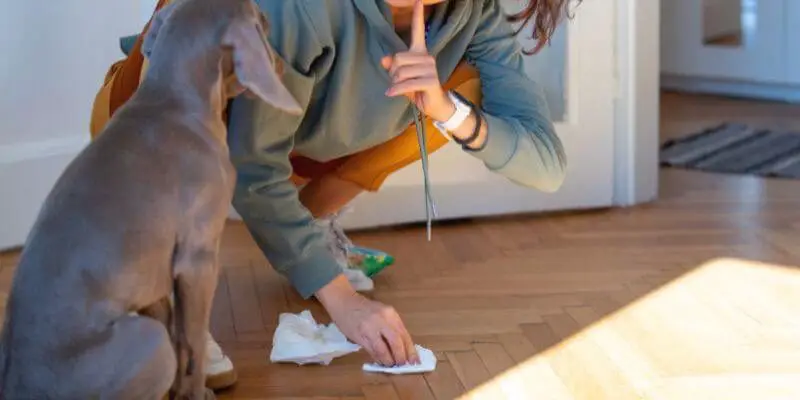
How long should you wait outside for your puppy to pee?
At least for 15 minutes. The amount of time that your puppy can wait before they go potty depends on their age.
In general, a 2-month-old puppy can wait for up to two hours before needing to pee, and that’s only if you are lucky.
When you take your pup outside, take a stroll instead of a run.
If you move too quickly, your dog might get scared or may not be able to process all of the information they want to with regard to the environment and whatever safe spaces for peeing might exist in your area.
Lots of people take their dogs out for a 30-minute walk in the morning and a one-hour (or more) one in the evening – and that’s a system that works for adult dogs, with complete control over their bladders.
Puppies need much more patience by comparison, so 15 minutes is the bare minimum they can work with at first.
Final thoughts
Since this behavior can be caused by incomplete potty training, fear or anxiety, as well as medical conditions, we suggest that you first take your dog in for a consultation at the vet clinic and start there.
Don’t worry – your puppy will get there and will reach the point where they only pee and poop outside.
References
- Decoding Your Dog: The Ultimate Experts Explain Common Dog Behaviors and Reveal How to Prevent or Change Unwanted Ones, Horwitz DF et al, 2015, https://www.ncbi.nlm.nih.gov/pmc/articles/PMC4399738/
- Canine House Soiling: Back to Basics, Kelly C. Ballantyne, 2017, https://todaysveterinarypractice.com/behavior/canine-house-soiling-back-basics/
- Pain and Problem Behavior in Cats and Dogs, Daniel S. Mills et al, 2020, https://www.mdpi.com/2076-2615/10/2/318/htm
- Exploring the Understanding of Best Practice Approaches to Common Dog Behavior Problems by Veterinary Professionals in Ireland, Emma Shalvey et al, 2019, https://www.ncbi.nlm.nih.gov/pmc/articles/PMC6429707/

Written by: Dr. Cristina Vulpe
Dr. Cristina Vulpe is a certified veterinarian who graduated in 2011 and earned her PhD in canine oncology in 2015, with a thesis focused on the diagnosis of abdominal tumors in dogs.

